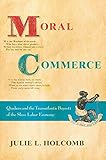Moral Commerce : Quakers and the Transatlantic Boycott of the Slave Labor Economy / Julie L. Holcomb.
Material type: TextPublisher: Ithaca, NY : Cornell University Press, [2016]Copyright date: ©2016Description: 1 online resource (272 p.) : 6 haltonesContent type:
TextPublisher: Ithaca, NY : Cornell University Press, [2016]Copyright date: ©2016Description: 1 online resource (272 p.) : 6 haltonesContent type: - 9781501706073
- Antislavery movements -- Great Britain -- History
- Antislavery movements -- United States -- History
- Quaker abolitionists -- Great Britain
- Quaker abolitionists -- United States
- African-American Studies
- Discrimination & Race Relations
- U.S. History
- HISTORY / United States / 19th Century
- Quakers, Abolition, Slavery, Consumerism, Gender inequality
- 326/.80973 23/eng/20230216
- online - DeGruyter
| Item type | Current library | Call number | URL | Status | Notes | Barcode | |
|---|---|---|---|---|---|---|---|
 eBook
eBook
|
Biblioteca "Angelicum" Pont. Univ. S.Tommaso d'Aquino Nuvola online | online - DeGruyter (Browse shelf(Opens below)) | Online access | Not for loan (Accesso limitato) | Accesso per gli utenti autorizzati / Access for authorized users | (dgr)9781501706073 |
Browsing Biblioteca "Angelicum" Pont. Univ. S.Tommaso d'Aquino shelves, Shelving location: Nuvola online Close shelf browser (Hides shelf browser)

|

|

|

|

|

|

|
||
| online - DeGruyter Saving Our Cities : A Progressive Plan to Transform Urban America / | online - DeGruyter A Most Enterprising Country : North Korea in the Global Economy / | online - DeGruyter Imagining a Greater Germany : Republican Nationalism and the Idea of Anschluss / | online - DeGruyter Moral Commerce : Quakers and the Transatlantic Boycott of the Slave Labor Economy / | online - DeGruyter Hard Sell : Work and Resistance in Retail Chains / | online - DeGruyter Samurai to Soldier : Remaking Military Service in Nineteenth-Century Japan / | online - DeGruyter My Nuclear Nightmare : Leading Japan through the Fukushima Disaster to a Nuclear-Free Future / |
Frontmatter -- Contents -- List of Illustrations -- Acknowledgments -- Introduction A Principle Both Moral and Commercial -- 1. Prize Goods: The Quaker Origins of the Slave-Labor Boycott -- 2. Blood- Stained Sugar: The Eighteenth- Century British Abstention Campaign -- 3. Striking at the Root of Corruption: American Quakers and the Boycott in the Early National Period -- 4. I Am a Man, Your Brother: Elizabeth Heyrick, Abstention, and Immediatism -- 5. Woman’s Heart: Free Produce and Domesticity -- 6. An Abstinence Baptism: American Abolitionism and Free Produce -- 7. Yards of Cotton Cloth and Pounds of Sugar: The Transatlantic Free- Produce Movement -- 8. Bailing the Atlantic with a Spoon: Free Produce in the 1840s and 1850s -- Conclusion: There Is Death in the Pot! -- Notes -- Index
restricted access online access with authorization star
http://purl.org/coar/access_right/c_16ec
How can the simple choice of a men’s suit be a moral statement and a political act? When the suit is made of free-labor wool rather than slave-grown cotton. In Moral Commerce, Julie L. Holcomb traces the genealogy of the boycott of slave labor from its seventeenth-century Quaker origins through its late nineteenth-century decline. In their failures and in their successes, in their resilience and their persistence, antislavery consumers help us understand the possibilities and the limitations of moral commerce. Quaker antislavery rhetoric began with protests against the slave trade before expanding to include boycotts of the use and products of slave labor. For more than one hundred years, British and American abolitionists highlighted consumers’ complicity in sustaining slavery. The boycott of slave labor was the first consumer movement to transcend the boundaries of nation, gender, and race in an effort by reformers to change the conditions of production. The movement attracted a broad cross-section of abolitionists: conservative and radical, Quaker and non-Quaker, male and female, white and black. The men and women who boycotted slave labor created diverse, biracial networks that worked to reorganize the transatlantic economy on an ethical basis. Even when they acted locally, supporters embraced a global vision, mobilizing the boycott as a powerful force that could transform the marketplace. For supporters of the boycott, the abolition of slavery was a step toward a broader goal of a just and humane economy. The boycott failed to overcome the power structures that kept slave labor in place; nonetheless, the movement’s historic successes and failures have important implications for modern consumers.
Mode of access: Internet via World Wide Web.
In English.
Description based on online resource; title from PDF title page (publisher's Web site, viewed 26. Apr 2024)


